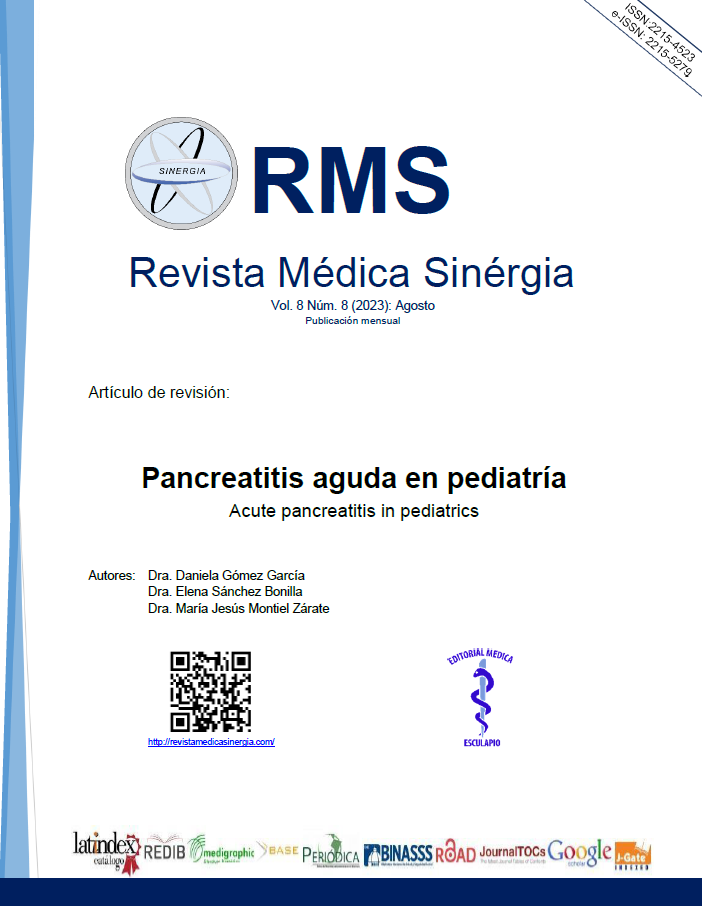Abstract
Acute pancreatitis (AP) is an inflammation of the pancreas that can be severe in the pediatric population. The main cause of this disease is cholelithiasis and the main risk factor linked to BP is genetic mutations. Diagnosis is made based on clinical symptoms, laboratory tests, and diagnostic imaging. Initial treatment includes early nutrition, aggressive hydration with crystalloid solutions, and administration of analgesics, such as morphine. In some cases, endoscopic intervention may be necessary. Patients should be carefully monitored during the first 48 hours of hospitalization for any signs of complications. Patients should be carefully monitored during the first 48 hours of hospitalization for any signs of complications. After discharge, further evaluation is recommended to identify possible underlying causes and prevent future episodes of PA. After discharge, further evaluation is recommended to identify possible underlying causes and prevent future episodes of PA. In general, adequate and timely management can prevent serious complications and improve the prognosis of AP in the pediatric population, however, there are cases where pseudocysts, pancreatic necrosis and abscesses are observed as sequelae of this disease.
Keywords
References
Bhanot A, Majbar AA, Candler T, Hunt LP, Cusick E, Johnson PRV, et al. Pancreatitis aguda en niños: morbilidad y resultados al año 1. BMJ Paediatr Open [Internet]. 2022 [citado el 08 abril 2023];6(1). Disponible en: http://dx.doi.org/10.1136/bmjpo-2022-001487
Szatmary P, Grammatikopoulos T, Cai W, Huang W, Mukherjee R, Halloran C, et al. Acute pancreatitis: Diagnosis and treatment. Drugs [Internet]. 2022 [citado el 08 abril 2023];82(12):1251-76. Disponible en: http://dx.doi.org/10.1007/s40265-022-01766-4
Saeed SA. Acute pancreatitis in children: Updates in epidemiology, diagnosis and management. Curr Probl Pediatr Adolesc Health Care [Internet]. 2020 [citado el 08 abril 2023];50(8):100839. Disponible en: http://dx.doi.org/10.1016/j.cppeds.2020.100839
Urooj C, Jagani S, Kirkham S. Una revisión de la pancreatitis aguda en la era de COVID-19. Paediatr Child Health (Oxford) [Internet]. 2021 [citado el 08 abril 2023];31(12):423–7. Disponible en: http://dx.doi.org/10.1016/j.paed.2021.09.001
Trout AT, Ayyala RS, Murati MA, Squires JH, Callahan MJ, Chavhan GB, et al. Estado actual de las imágenes de la pancreatitis pediátrica: revisión narrativa del panel de expertos de AJR. AJR Am J Roentgenol [Internet]. 2021 [citado el 08 abril 2023];217(2):265–77. Disponible en: http://dx.doi.org/10.2214/AJR.21.25508
Agarwal J. Intervenciones endoscópicas pancreatobiliares para la patología pancreática pediátrica. Dig Dis Sci [Internet]. 2020 [citado el 08 abril 2023];65(11):3091–101. Disponible en: http://dx.doi.org/10.1007/s10620-020-06513-x
Uc A, Husain SZ. Pancreatitis in children. Gastroenterology [Internet]. 2019 [citado el 08 abril 2023];156(7):1969–78. Disponible en: http://dx.doi.org/10.1053/j.gastro.2018.12.043
Ocskay K, Vinkó Z, Németh D, Szabó L, Bajor J, Gódi S, et al. La hipoalbuminemia afecta a un tercio de los pacientes con pancreatitis aguda y se asocia independientemente con la gravedad y la mortalidad. Sci Rep [Internet]. 2021 [citado el 08 abril 2023];11(1):24158. Disponible en: http://dx.doi.org/10.1038/s41598-021-03449-8
Farrell PR, Hornung L, Farmer P, DesPain AW, Kim E, Pearman R, et al. ¿Quién está en riesgo? Un modelo pronóstico para la predicción de la gravedad en la pancreatitis aguda pediátrica. J Pediatr Gastroenterol Nutr [Internet]. 2020 [citado el 08 abril 2023];71(4):536–42. Disponible en: http://dx.doi.org/10.1097/MPG.0000000000002807
Boonthai A, Tanpowpong P, Puttanapitak C, Aeesoa S, Losty PD, Molagool S. Pancreatitis aguda en la infancia: una experiencia de 10 años de un centro quirúrgico universitario tailandés. Páncreas [Internet]. 2022 [citado el 08 abril 2023];51(7):808–13. Disponible en: http://dx.doi.org/10.1097/mpa.0000000000002109
Murati MA, Ames JC, Trout AT, Dietz KR. Glosario de imágenes de resonancia magnética de los hallazgos de pancreatitis pediátrica y la clasificación revisada de Atlanta. Pediatr Radiol [Internet]. 2022 [citado el 08 abril 2023];52(2):189–99. Disponible en: http://dx.doi.org/10.1007/s00247-021-05017-8
Cole S, Wakeham M, Werlin S, Goday PS. Clasificación y manejo nutricional de la pancreatitis aguda en la unidad de cuidados intensivos pediátricos. J Pediatr Gastroenterol Nutr [Internet]. 2018 [citado el 08 abril 2023];67(6):755–9. Disponible en: http://dx.doi.org/10.1097/MPG.0000000000002147
Panchoo AV, VanNess GH, Rivera-Rivera E, Laborda TJ. Pancreatitis hereditaria: una revisión actualizada en pediatría. World J Clin Pediatr [Internet]. 2022 [citado el 08 abril 2023];11(1):27–37. Disponible en: http://dx.doi.org/10.5409/wjcp.v11.i1.27
Hart PA, Bradley D, Conwell DL, Dungan K, Krishna SG, Wyne K, et al. Diabetes después de pancreatitis aguda. Lancet Gastroenterol Hepatol [Internet]. 2021 [citado el 08 abril 2023];6(8):668–75. Disponible en: http://dx.doi.org/10.1016/S2468-1253(21)00019-4
Bellin M. Diabetes pancreatogénica en niños con pancreatitis aguda y crónica recurrente: riesgos, detección y tratamiento (mini-revisión). Front-Pediatr [Internet]. 2022 [citado el 08 abril 2023];10:884668. Disponible en: http://dx.doi.org/10.3389/fped.2022.884668

This work is licensed under a Creative Commons Attribution-NonCommercial 4.0 International License.
Copyright (c) 2023 Array


